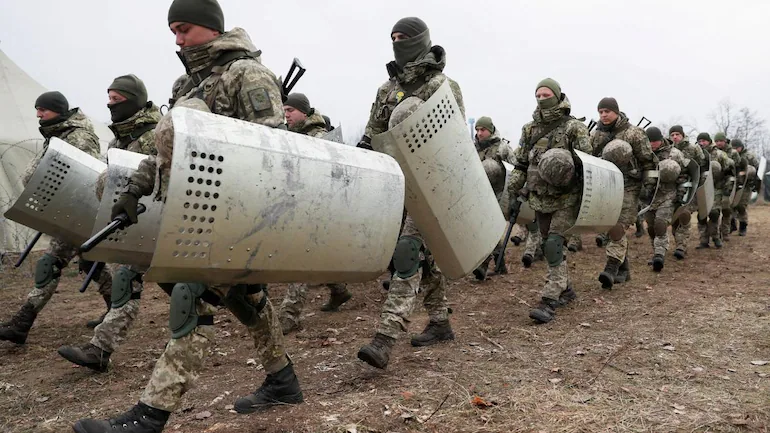Cluj-Napoca, Romania – “I assure you, no Romanian should fear for the safety of himself and his family,” Romanian President Klaus Iohannis said on Thursday, shortly after Russian troops launched a full-scale invasion of Ukraine – its biggest military deployment since World War II.
“Romania has the broadest security guarantees conceivable.” We have never been better safeguarded against potential aggression in our history. Romania will not be drawn into the military conflict in Ukraine,” said the Romanian leader.
In a television address the same evening, Defence Minister Vasile Dancu stated that Romanians are “not in danger” and should not be concerned because “there will be no military clash between NATO and Russia.”
However, pledges from the country’s leadership may have little impact in Romania, a NATO member since 2004, where many citizens have been on edge since Russia’s war on Ukraine.
Romania’s apprehension stems from centuries of Russian invasions. Transnistria, a Russian-controlled enclave in Moldova, is Moscow’s westernmost garrison, located within 100 miles (160 kilometres) from the Romanian border.
Romania has vowed “unconditional political support” for Ukraine in the event of a Russian invasion, as well as cybersecurity assistance.
As bombs began to fall in Ukraine early Thursday morning, Valentin Lăzureanu, a student in Bucharest, awoke to a barrage of notifications on his phone reporting the Russian onslaught.
“When the news and photographs started pouring in, I realised we didn’t have a specific location for it, and everyone was getting their knowledge from so many disparate sources,” the 24-year-old told Al Jazeera.
Lăzureanu established a Facebook group where individuals could share resources and verify information in order to better comprehend what was going on beyond the border.
Since then, young Romanians in the War Room group have been debating potential scenarios that could potentially envelop their country.
“How likely is it that they would invade Romania as well?” asked one in the group.
Romanian foreign policy analyst Oana Popescu-Zamfir told Al Jazeera that while a direct military conflict between Russia and Romania is unlikely, political, economic and social repercussions of the Ukraine invasion are “palpable”.
“The regional security situation is deteriorating,” Popescu-Zamfir stated. “This has an economic impact on Romania since investors regard the entire region as having a larger risk of investment.”
Popescu-Zamfir also mentioned that Romania, like much of Europe, relies on Russian gas. The conflict may cause a surge in gas prices or a total shutdown of gas flows into Romania.
Ukrainians seek asylum in Romania
Aside from the economic impact, Romania has received around 10,000 Ukrainian asylum applicants at its northern and eastern borders since Russia’s invasion.
Earlier this week, Defense Minister Dincu stated that Romania is capable of accepting 500,000 refugees.
According to Romanian media sources, no initiative to create camps for Ukrainian asylum seekers has yet been taken.
Because of the lack of government action, many Romanians have formed another Facebook group, United for Ukraine, where almost 50,000 people have offered to pay for Ukrainian asylum seekers’ flights or hotel fees, or even give them with someplace to stay.
Ukraine also boasts a sizable Romanian population of approximately 150,000 individuals, many of whom are likely to return to their homeland in the following days.
‘US will defend every centimetre of NATO’
When US Vice President Joe Biden announced new penalties on Russia on Thursday evening, he also promised to sending more troops to Romania, a major NATO ally in the region that hosts alliance facilities as well as a critical missile defence system.
“If he (Russian President Vladimir Putin) steps in NATO countries, we will intervene,” Biden stated in his speech, which was widely covered in Romania.
“The United States will protect every millimetre of NATO,” Biden stated.
Germany and France also deployed weaponry, troops, and aircraft to Romania in the run-up to Russia’s invasion of Ukraine, which has been vocal in its support for the transatlantic alliance and criticism of Moscow’s activities in Ukraine.
However, foreign policy expert Popescu-Zamfir claims that Central and Eastern European countries have “repeatedly warned of the dangers of Russian aggression.”
Popescu-Zamfir considers the Black Sea, which Romania shares with Russia, Ukraine, Georgia, and Turkey, to be a “very vulnerable territory.”
“Romania, in particular, made efforts during the [2016] NATO summit in Warsaw, when greater emphasis was placed on the Baltic countries and Poland, whereas we had no contingency measures for the Black Sea,” she told Al Jazeera.
Meanwhile, the Romanian media has been monitoring the situation in Ukraine around the clock, assessing how the invasion would effect their country.
“I am hopeful the West will respond to Russia’s aggression with unity,” said Lăzureanu.
‘Will they invade Moldova?’
Many Romanians are also concerned about Moldova, a 2.6 million-person country with significant historical and linguistic ties to Romania but is not a NATO member.
“The Republic of Moldova is, in many ways, an extension of Romania,” Popescu-Zamfir told Al Jazeera.
“Will they invade Moldova as well?” wondered one of the War Room members on Lăzureanu’s Facebook page.
Former Romanian President Traian Basescu even pushed the government to hold a “quick referendum” to unify Moldova and Romania in order to block Russia’s advance into the territories.
While President Iohannis rejected the notion, he did speak with his Moldovan counterpart Maia Sandu after Russia attacked Ukraine and assured her of his assistance in the event of any Russian action.
Romania and Moldova were united as one entity in the early twentieth century, but Moldova became a Soviet Union republic in 1940.
The modern-day Republic of Moldova, established after the fall of the Soviet Union in 1991, is nonetheless socially and politically influenced by Russia.




















